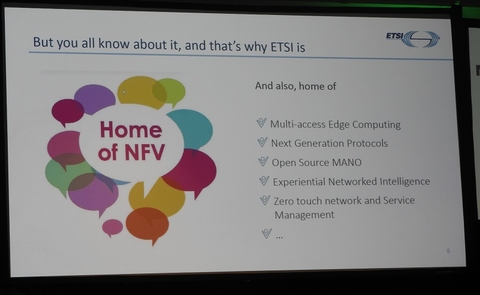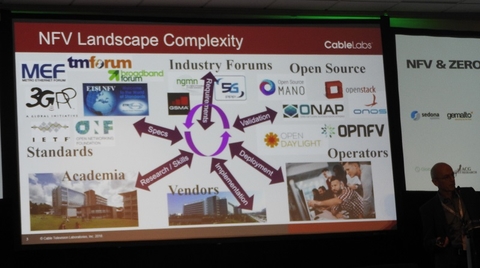SAN JOSE, California—In case there was any doubt, discussion at the Layer 123 NFV & Zero Touch World Congress provided further evidence that the members of the standards world—which has driven wireless technology for decades and the open source that operators are embracing nowadays—are still trying to figure out their relationships with one another.
Luis Jorge Romero, director general at the standards organization European Telecommunications Standards Institute (ETSI), brought it up during a keynote Thursday that sparked an interchange during Q&A. Romero said he’s heard many comments that standards are over with because, of course, everything is open source, and he hears questions like: “What are you going to do the day after tomorrow?”
But that’s not been his experience. “Of course, I’m a little bit biased,” he said. “But I would like to have this opportunity to remind [people] what they already know about standards.”

The ultimate goal of standards is finding solutions to problems in a cooperative manner and providing stability for businesses. Industry needs to rely on many people working together and interoperability is paramount. And, he said, standardization is one of the few occasions where antitrust authorities allow competitors to work together because the benefits are so great for everybody.
Standards also provide for many possible implementations, which might include open source.
He’s also “a little bit fed up” hearing people lament how slow the standards process ends up being. “Well, on one side, process-wise, it’s true we have a lot to learn and we are learning. On the other side, what really takes time to get standards ready is consensus.” But that consensus also provides assurance that the technology will get deployed.
He acknowledged there are times when a solution is pushed by voting and getting the majority vote by whatever means, and sometimes it’s better to wait a couple months rather than rushing the standards through at any cost.
While none of this is new, he said he wanted to take the opportunity to remind people what’s going on.
ETSI is happy to be home to the NFV standardization work. Some pieces of standards are being developed in ETSI and in some cases, ETSI partners with others.
A member of the audience with a background in standards and open source remarked that one of the challenges is in how the two conduct business. The way the standards bodies operate is very different from the way the open source community operates.
The obvious difference is in IPR where there are far fewer constraints in the open source world. But in the open source world there is a blurring as to whether an open source development is a standard. Right now, there's no place to even have a discussion in a formal sense between a standards body and an open source community.
Romero said that ETSI is having this discussion internally at several levels and it’s trying to have these discussions at open source foundations.
“We need to entertain this discussion because I agree with you, this has not happened.” Even inside ETSI, “we’re trying to improve this communication, this relationship,” he said. “This is something we’re looking at very carefully.”
RELATED: CableLabs’ NFV guru sees times a changin' as ETSI prepares to release new specs
In a separate keynote on Wednesday, Don Clarke, principal architect at CableLabs, presented a slide that illustrates just how complex the NFV industry is right now.

Clarke previously did R&D at British operator BT and was the editor of the joint carrier white paper that ignited the NFV space more than five years ago. He was also one of those who founded the Open Platform for NFV (OPNFV), which is designed to bring together open source projects.
OPNFV and ETSI co-locate their NFV testing events; the next one is May 29-June 8 in Sophia Antipolis, France. ETSI and OPNFV are trying to increase collaboration across the standards and OPNFV, which is an open source project within The Linux Foundation.
The innovation with NFV comes with how it’s implemented and standards remain important, according to Clarke.
“The faster we get all these forum standards done, the faster we are going to be able to create interoperable solutions that do really cool things,” he said.

